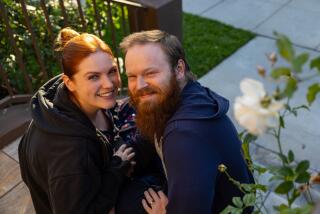SATURDAY-NIGHT SPECIAL : NBC SEES BOOM IN ‘THE BABY BUSINESS’
NEW YORK — Babies are the most important business in the universe. We either have too many or not enough. We have them, raise them and--sadly enough--sometimes give them away, trade them or sell them.
This business of babies is covered quite nicely in an NBC special, “The Baby Business,” featuring a gang of old friends from “1986,” the network’s defunct news magazine.
Instead of “1986,” NBC has decided to air a series of news specials. “The Baby Business,” airing Saturday at 10 p.m. (Channels 4, 36 and 39), is one of them.
The show begins with correspondent Maria Shriver interviewing an infertile couple who have been trying unsuccessfully for six years to have a child.
Shriver, who approached executive producer Paul Greenberg with the idea for the special, says the piece shows how badly some people want children.
“Their whole lives go on schedule,” Shriver said in a telephone interview. “They have sex on schedule, they go through endless tests, often painful, to find out what the problem is. They have operations to reverse the trouble, fix the tubes or whatever. Some tests yield nothing.
“There is isolation. Marriages are shaken. There is a huge financial cost. Some couples move to another state just to see a certain doctor. There are waiting lists for waiting lists. It’s an incredible ordeal.”
Showing the lengths some people will go to have children may lend an understanding to surrogate mothers such as Mary Beth Whitehead of the widely publicized “Baby M” case in Hackensack, N.J.
This week, a judge awarded custody of “Baby M” to her father and stripped the child’s biological mother of all parental rights, partly stemming from her behavior before and during the custody trial.
The NBC special features another surrogate mother who appears to have a healthy attitude about what she is doing.
Correspondent Connie Chung staked out a hospital last week awaiting the birth of the child, and after 12 hours of waiting on Academy Awards night, Quinn Campbell was born, weighing in at 9 pounds, 10 ounces.
“I’ve never been a father before,” Chung said in an interview. “Now I know how a father feels waiting for a baby. I had also never seen a live birth. It was really quite a moment.”
The miracle of life takes on even more meaning when the child is handed to the biological mother, Karen Hill of Bloomington, Calif., in front of her two sons, and the infertile couple waits for their daughter.
“What more can I do for someone else than to give them a child?” asks Hill.
Chung then talks to another surrogate mother who gave up her child in 1980 and now regrets her decision. “It’s not normal to give babies away,” the woman says angrily.
Correspondent Lucky Severson tackles adoption. “For every white healthy baby needing a home in this country, there are about 100 desperate couples willing to pay the price, some as high as $50,000,” Severson says in the show. “It’s a buyer’s market.”
Some couples are now placing newspaper ads across rural America asking women who are considering abortions to instead consider offering their children for adoption.
In this segment, Severson urges caution. Unscrupulous people who trade babies like cattle do exist and he shows us one.
Chief science correspondent Bob Bazell provides the medical information and anchor Tom Brokaw weaves all the segments together with narration.
For Chung and Shriver, who are both married to successful men, both driven by their own careers and both childless, the special took on additional meaning.
“I’m 40 1/2,” Chung said. “I just got married two years ago. I don’t know what to do. I’ve put all of this off for so many years. Now I’m up against the wall. My husband--we had a commuter marriage for two years and a commuter relationship for seven years before that.
“Since last June is the first time we’ve been living together. It took me so long to even consider m-m-m-m-m-m-marriage and now it’s b-b-b-b-b-baby.”
The biological time clock is also ticking for Shriver.
“Doctors say age plays a big role, so if you’re sitting there and you’re 31, or 40, you’ve got to think, ‘Am I playing with the odds? Am I putting everything at risk for a career?’ Right now it’s difficult in my job to have a kid because I’m always traveling,” Shriver said.
More to Read
The complete guide to home viewing
Get Screen Gab for everything about the TV shows and streaming movies everyone’s talking about.
You may occasionally receive promotional content from the Los Angeles Times.






